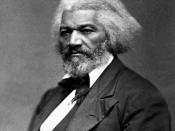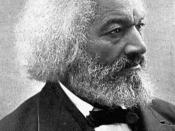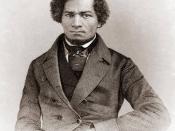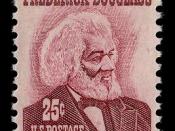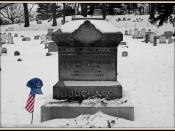Fredrick Douglass's autobiographical account The Narrative of Fredrick Douglass discusses educational barriers that slaves encountered in the 19th century. Douglass descends on an intellectual journey at the young age of seven or eight when he is given to Hugh and Sophia Auld. Douglass describes Mrs. Auld as having a kind heart, she begins to teach Douglass to read. However, due to her husband's belief that learning will "forever unfit [Douglass] to be a slave"ÃÂ(973), her reading lessons were short-lived. Mr.Auld's discouraging words, end up motivating Douglass to actively pursue education and dedicate himself to learning, thereby he breaks traditional black protosocial behaviors. Without instruction, Douglass accomplishes the impossible and teaches himself to read and write.
Eventually, Douglass stumbles onto newspapers and publications such as the "Liberator"ÃÂ that inform him of abolishment movements in the North and lead him to believe that freedom is a conceivable notion. The publications and newspapers reveal to Douglass that all white men do not agree with slavery.
Through reading the Bible and other texts, Douglass constructs a sense of his dualistic self, which opens up his eyes as he begins to believe that he is more than just a physical body. The ability to read and write becomes proof to Douglass that slaves are not subhuman nor intellectually inferior. The realization of humanity brings confidence to Douglass. Equipped with both literacy and self worth, Douglass no longer classifies himself as subhuman. Douglass is able to realize that literacy is "the pathway from slavery to freedom"ÃÂ(974). First of all literacy is a precondition of freedom for Douglass because it educates him to realize that slavery is immoral and unethical, and should not be justified. Secondly, literacy gives Douglass the inner strength and the confidence that is essential to his freedom.
Through many types of writings such as Human rights readings and the Bible, Douglass discovers the meaning of freedom and critically reflects upon the immorality of slavery. Human rights readings by authors such as Richard Brinsely Sheridan allow Douglass to understand that all Americans do not agree with slavery. By reading newspapers and other texts dedicated to the abolishment of slavery, Douglass views the world differently, and gains hope for freedom in the future. Once Douglass believes freedom is possible, it becomes an addiction and realizes that he will have his freedom free or die trying: "Freedom now appeared, to disappear no more"ÃÂ ( 977). Religious writings such as the Bible also become a link to freedom for it enables Douglass to read God's words and interpret the Bible for himself, and to not have to rely on white man's second hand misinterpretations. The Bible teaches Douglass, that ownership of another man's soul is a sin. Douglass realizes that the religion in the south is "a mere covering for the most horrid of crimes, a justifier of the most appalling barbarity"ÃÂ(p.991) and masters the arguments against slavery. The Biblical readings push Douglass to pursue freedom passionately because it allows him to believe that God is on his side. Biblical readings and his interpretations enable Douglass to question the morality of slavery and allow him to realize how immoral slavery is. Reading from religious texts allows Douglas to believe that slave ownership cannot be justified "[gaining] from the dialogue the power of truth over every slave owner"ÃÂ(976).
Moreover, with the ability to read and write, Douglass gains inner strength and confidence. Knowledge enables Douglass to be intellectually superior over his masters and gains a sense power over his masters. Literacy becomes proof to Douglass that he is worthy of freedom; it is proof of his humanity. This understanding gives Douglass tremendous inner power and allows him to over-power his master, Mr. Convey, in a fistfight. As a result, Douglass realizes that he may be a slave on the outside but on the inside he is free: "I may be slave in form, but not in fact"ÃÂ(977) Douglass distinguishes between his mind and his body and realizes that his mind is more important than his physical body. Consequently, with mind full of knowledge, Douglass grows restless in his mediocre daily tasks, and feels that he cannot be restrained any longer. Douglass breaks free through his writing and represents himself in history. It becomes apparent that as Douglass's mind gets freer, the closer he is to being physically free. With confidence from literature, Douglass educates not only his individual self but has the power to educate his fellow slaves to read and write. Douglass ignores prohibitions set by the slave owning community and teaches his fellow slaves for the purpose of "bettering the condition of [their] race"ÃÂ (992). This reveals the importance of literacy in connection to freedom for Douglass, for without the knowledge that reading brought about, Douglass would have had no notions of freedom for he would have been oblivious to the fact that it was possible. Douglass and his fellow slaves risk violence from their masters to escape the "metal darkness"ÃÂ(992) that they have been living in, to learn to read and write.
Overall, Douglass illustrates that literacy is a crucial precondition of freedom. Douglass states that in order for himself to be free he had to firstly, discover the meaning of freedom and realize that it is unethical and secondly, take advantage of the inner strength that stemmed from knowledge to gain inner power and confidence. Without either of these two factors, a whipped and restricted man would have resulted with an absence of both mental and physical freedom. In a historical perspective Douglass's Narrative is a success story. Douglass's memory will forever be accessible in his Narratives and he will continue to educate students. Literacy allows Douglass to maintain a sense of power, as he will forever be an inspiration to his readers. Douglass through his personal accounts embed in history the struggles and mistreating of his race. When Douglass discovers literacy it becomes the first stepping-stone in his long journey to be free; furthermore, literacy allows Douglass to implant himself permanently in history.
